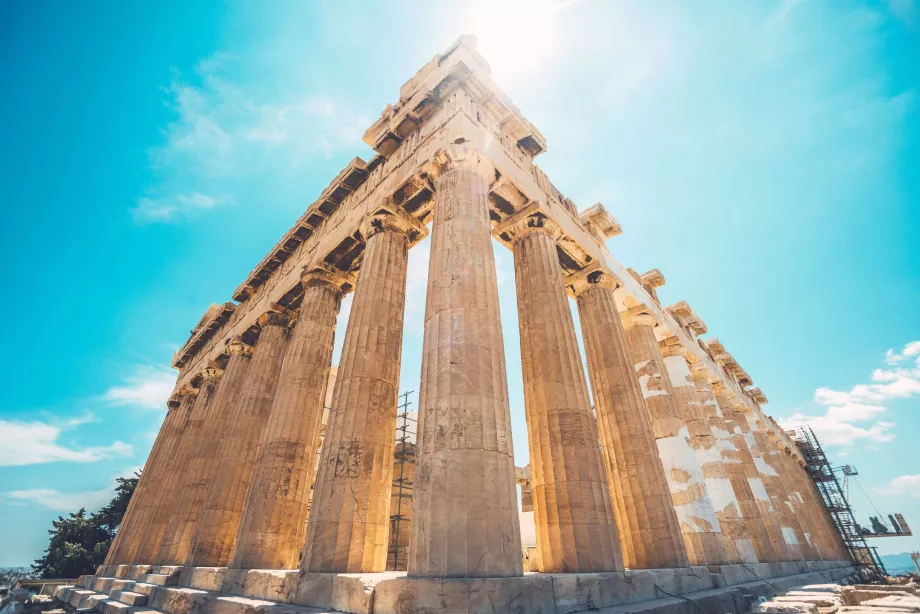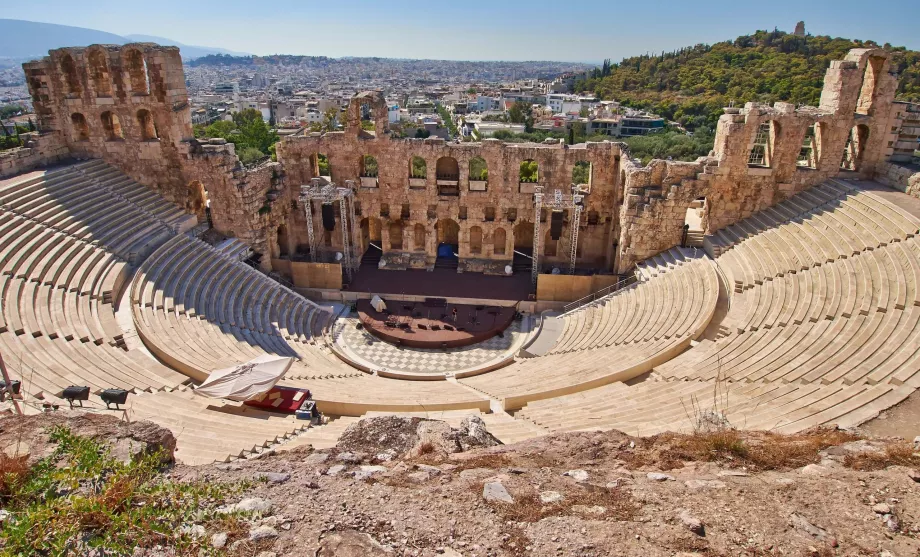Culture and history of Greece

How easy is it to speak English in Greece? What are Greeks like and when are shops closed in Greece?
Compare prices for flights to Greece on skyscanner.com
Language
The official language in Greece is Greek. More precisely, it is Neo-Roman, a language derived or continuously evolved from Ancient Greek.
Greek does not use the Latin alphabet, but the so-called alfabet, the Greek script from which Latin, but also Cyrillic or Cyrillic alphabet, is based. The alphabet is the oldest script still in use in Europe.
Although most places, road signs, restaurants and bus stops have transliterated words in Latin, this is not always the case. It can therefore be useful to at least learn how to navigate the Greek signs.
Knowledge of English
Unlike other southern European countries, English is commonly spoken in Greece, it just might take you a while to get used to their specific accent and pronunciation.
The English of the Greeks is by no means perfect, but it will suffice as a basic colloquialism and you can get along with it in all tourist spots.
English is not spoken or understood at all by the older generation.
People
Greeks are sociable, friendly, always willing to help, with their hearts on their sleeves. They have plenty of time for everything and they don't get distracted by the fact that you might be in a hurry.
Don't expect a Greek to be on the minute, a quarter to half an hour late is often common.
Greeks have their own rules, which are often paradoxical, but must be followed. The Athens metro, for example, is kept scrupulously clean; an employee will warn you that you must not eat a banana on the platform, yet the whole city is full of homeless people who have their dwellings right on the sidewalks. Nobody minds.
The Greeks are true patriots, even the shabbiest apartment buildings proudly fly the blue and white national flag and a native girl explains to you, without any modesty, that "Greeks definitely work harder than Germans."
Greek siesta
The Greeks, like the Italians and other southern nations, are very strict about their midday siesta, especially in summer.
When it is hottest outside, Greeks stop working and go home to sleep or at least rest and do nothing.
Even many shops and services are closed for 2 or 3 hours over midday (usually from 10:00 to 13:00 or 14:00).
Holidays
In Greece, especially in the countryside, religion plays a very important role. This means that the celebrations of religious festivals here are truly spectacular. The most important festival is Easter.
It is calculated using the Julian calendar, so it usually falls on a different date than, for example, the Christian one.
Masses are held throughout Easter, culminating on Good Friday. The typical meal is roast lamb and lamb tripe soup. Each region celebrates the holiday a little differently, for example in Corfu on White Saturday ceramic jars filled with water are thrown out of windows as a symbolic cleansing from sins.
Christmas is celebrated on 25 December and is followed by a 40-day fast called Sarakosty.
In addition to these days, the country also celebrates many others related to either history or religion. The celebrations tend to be truly spectacular, including fireworks, parades and parties. Greeks are simply good at having fun.
Most shops are closed on holidays and public transport is limited.
On Sundays and generally at weekends, supermarkets, restaurants and all tourist services are open.
List of Greek public holidays - days of rest and holidays
- 1 January - New Year
- 6 January - Feast of the Epiphany
- 7 January - Feast of John the Baptist
- 25 March - Independence Day from the Ottoman Empire
- 1 May - Labour Day
- 15 August - Feast of the Assumption
- 28 October - Ochi Day, celebrating the rejection of the Italian ultimatum of 1940
- 25 December - Christmas Day
- 26 December - Christmas Day
Plus floating holidays:
- Easter - Good Friday
- Easter - Easter Monday
- Clean Monday - 48 days before Easter
- Pentecost - 50 days after Easter
History in a nutshell
The history of Greece is both the history of the first advanced culture on European soil and the first ever democracy.
The history of the state dates back to the third millennium BC, when the Minoan civilisation began to develop, followed by the Mycenaean civilisation, whose architectural remains can still be admired today throughout what is now Greece, including the islands.
From the eighth century BC, a tradition of games began in Olympia, which has survived intermittently to the present day.
The country was ruled by the Turks for almost 370 years, and after the civil war of 1821, Greece was a monarchy until the establishment of the Republic. In 1981, the Hellenic Republic joined the European Union.
Culture
The country is specific for its rich history, the ancient Greeks founded theatre, astronomy, rhetoric, philosophy and democracy. Contemporary Greek culture is mainly based on Byzantine and ancient traditions.
One of the most important aspects is folk music, which is still very popular in Greece.
The most popular instrument is the bouzouki, a special strumming instrument that makes Greek music distinctive and recognisable.
Local customs and traditions are highly revered, and Easter and Christmas still retain many customs from pre-Christian times. Weddings, which usually last for several days, are also a major celebration.
Tourism
Tourism is one of the most important income earners in Greece, so the population strives for the highest possible range and quality of services. The country is politically stable, safe. Thanks to the large number of islands, each of which is something specific, you will never be bored and will be happy to return.
The tourist infrastructure is of a good standard in terms of accommodation and services in the larger resorts.
Book accommodation in advance at a discount
However, on smaller islands or in smaller towns by the sea, you will often only find a basic food offer, and public transport is also very limited compared to other European countries.
The good news is that you can find a taverna in absolutely every village and there is at least one car rental on every island.
Any questions left?
If you have any questions or comments about the article...



